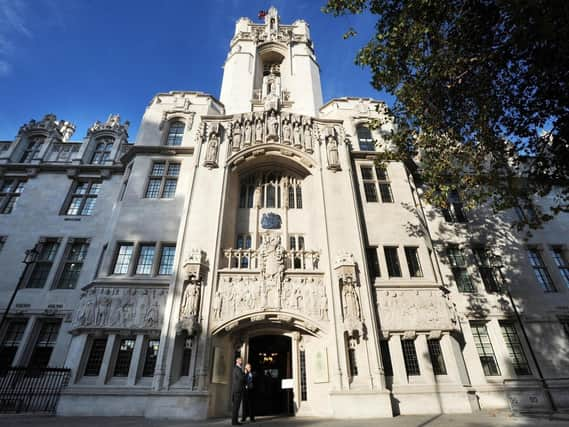Owen Polley: The Rwanda bill this week could mean a tricky start to 2024 for unionists


To wit, according to a Belfast Telegraph report citing unattributed ‘sources’, the government might publish its Windsor Framework offer to the DUP, if the party does not restore power-sharing by Thursday.
In theory, the secretary of state is supposed to call an election if an executive and speaker are not in place by that date. In reality, we know that Chris Heaton-Harris has repeatedly moved the deadline before.
Advertisement
Hide AdAdvertisement
Hide AdBut we also know how the government habitually presents deals or proposals on Northern Ireland.
The prime minister and his colleagues initially make all sorts of exaggerated claims, couched in language that suggests our problems have all been solved. Then the details are scrutinised and the real picture emerges, sometimes gradually but occasionally with rapid speed.
Ordinarily, the weight of media opinion in Northern Ireland and that of non-unionist politicians treats everything the government says with extreme scepticism and even hostility. They throw around the word ‘Tory’ like it’s a grave and damning insult and chunter on about London failing to understand us.
Unfortunately, though, that rule of thumb is redundant when any proposal creates or reinforces differences between Great Britain and Northern Ireland.
Advertisement
Hide AdAdvertisement
Hide AdIf the mooted deal with the DUP really is published, we know from past experience that it will be greeted by opinion-formers as if it were an impeccable document that contains nothing but the unvarnished truth. Unionists will be treated as fools and idiots if they cast doubt on so much as a comma.
That’s an abiding problem for unionism, but, unfortunately, it may not even be the most serious one it faces this week.
Tomorrow, a House Of Commons’ committee is due to examine the Rwanda Safety Bill.
This controversial legislation, which is intended to discourage illegal migrants from trying to reach the UK on ‘small boats’, could determine the fate of Rishi Sunak as Conservative leader and prime minister. Unfortunately, we are set to be drawn into the arguments, thanks to the effects of the Northern Ireland Protocol and Windsor Framework.
Advertisement
Hide AdAdvertisement
Hide AdBritain is often caricatured, after Brexit, as intolerant and inward-looking, but in fact it is consistently one of the least racist and most diverse countries in Europe. At the same time, across the western world, immigration has accelerated beyond anything we’ve experienced before.
It has already changed our societies in ways that we struggle to manage or understand. Think about the reaction to Hamas’s atrocities on the 7th of October. In the immediate aftermath of those attacks, crowds poured on to UK streets to express hatred for Israel rather than solidarity with the victims.
The government wants to start to deal with these issues by processing some asylum seekers in Rwanda. Ministers hope the scheme might dissuade migrants from undertaking risky journeys across the English Channel that put their lives at risk and sustain an industry in ‘people trafficking’.
To Mr Sunak’s frustration, the Supreme Court rejected his original plan as unlawful. It said that genuine refugees could potentially be returned to their home countries, where they might be harmed, and raised concerns about Rwanda’s reliability and human rights record.
Advertisement
Hide AdAdvertisement
Hide AdIn response, the government signed a new treaty with the Rwandan authorities, aimed at preventing those problems. It is now legislating to deem the African country safe, which involves instructing judges to set aside parts of the Human Rights Act.
Northern Ireland will become embroiled in this debate, because there are disputes about the plan’s compatibility with EU laws and our Brexit arrangements.
Some of the bill’s critics, like the DUP MP Sammy Wilson and David Jones MP of the Tory European Research Group (ERG), say that the legislation cannot apply here on the same basis as the rest of the country, because of the Windsor Framework. The framework included commitments from the government to maintain EU ‘rights’ laws in Northern Ireland, which give migrants extra potential legal options to challenge decisions to send them to Rwanda.
That means, in theory, that we could become asylum seekers’ favoured route into the UK, with all the social problems and extra pressures on services that that could entail.
Advertisement
Hide AdAdvertisement
Hide AdThey’ve also argued that, if it’s easier to enter Northern Ireland without fear of repercussions, then the authorities will be obliged to start checking people travelling to Great Britain from here. In other words, another Irish Sea border could be emerging, even as the government tries to browbeat unionists into accepting the existing trade barriers.
There are other potential issues too.
The bill’s right wing sceptics claim it won’t be effective, because it does not contain specific clauses that override the European Convention of Human Rights (ECHR). In response, the Labour MP, Stella Creasy, has already tabled an amendment invoking the Belfast Agreement, which included provisions on the ECHR.
This government has already shown repeatedly that it will not protect Northern Ireland’s integral place in the UK when nationalist campaigners cause a fuss. If the role in UIster of the human rights court in Strasbourg is in question, unionists can hardly be confident that we will not again be made an exception to British law.
This all amounts to an even trickier landscape for unionist politicians to navigate in 2024. They will have to muster reserves of skill and strategy that were not much evident as the protocol debacle unfolded.